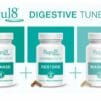
Ageing is a complicated process that each of us experiences in a unique way, especially when it comes to visible aspects of ageing like our hair or skin. Our genetics play an important role in our skin’s appearance. If both of your parents have maintained firm, smooth skin, chances are good that you will too. This is part of the intrinsic aspect of ageing, which combines with cell function and hormonal changes to affect up to 20% of the skin’s appearance. So, what about the remaining 80% or more of our face’s ageing process? Well, that is up to us! How well do you take care of your skin. Do you keep it moisturised and protected from harmful UV rays. Do you nurture it with a healthy, balanced diet and plenty of water. If not, chances are that you will notice the impact of these lifestyle choices as you get older, as extrinsic ageing takes a toll on your facial skin.
WHAT IS INTRINSIC AGEING?
Intrinsic, or chronological ageing, is the inevitable genetically determined process that naturally occurs. Intrinsic ageing is determined by each person’s individual genetic clock and is affected by the degenerative effects of free radicals and the body’s inability to perfectly repair their damage.
Over time, cells, tissues, and vital organs ‘rust’ or deteriorate. These internal changes to the muscle, fat and bones are not as visible as the signs of ageing on the skin, the external organ. Intrinsic ageing is a continuous process that usually begins in the mid-20s but may not become evident for decades. In a person’s 20s, collagen production begins to slow, and elastin has a bit less spring. Dead skin cells do not shed as quickly, and the turnover of new skin cells decreases.
WHAT ARE THE SIGNS OF INTRINSIC AGEING?
The apparent signs of intrinsic ageing include the loss and descent of underlying fat, leading to hollowed cheeks and eye sockets, as well as loss of firmness and sagging skin as the bones shrink away from the skin due to bone loss. While intrinsic ageing is hard to stop or alter, it can be worsened by external factors, known as extrinsic ageing.
WHAT IS EXTRINSIC AGEING?
The extrinsic, or preventable environmental factors that magnify intrinsic ageing, often act together with the normal ageing process to prematurely age skin.
From the air you breathe to the food you eat; extrinsic ageing is the result of environmental factors and lifestyle choices that occur to the skin instead of within it. That means your skin could look ten years older than your genetic age due to poor skin maintenance such as skipping sunscreen or not drinking enough water, but extrinsic ageing is easier to prevent and repair.
The most common forms of extrinsic ageing are caused by unprotected UV exposure, free radical damage, smoking, and a poor diet, which are all things that can be controlled and improved with a few lifestyle changes. External factors can also exacerbate intrinsic ageing, such as UV exposure and
consuming too much sugar. This can lead to an imbalance within the skin where harmful substances like free radicals and processes like glycation are more common, both of which influence the production of collagen.
WHAT ARE THE SIGNS OF EXTRINSIC AGEING?
Age-associated changes include thinning, laxity, fragility, and wrinkles. In addition, sun exposure leads to dyspigmentation, premature wrinkling, telangiectasia, and actinic elastosis.
The most common signs of extrinsic ageing include dark spots and discolouration, loss of skin volume and wrinkles.
WHAT CAN YOU DO?
In terms of your genes, it is hard to make any real changes, so you need to rely on fixing extrinsic ageing by ensuring you include key products in your daily skincare routine and minimise your skin’s exposure to pollution and UV rays. By reducing extrinsic ageing, you can positively affect intrinsic ageing, which will result in you enjoying a more youthful and healthier complexion for longer.
First, make sure you are using an antioxidant serum as part of your morning routine. Something with a high concentration of vitamin C, such as DMK’s Direct Delivery Vitamin C, which is a great place to start to protect your skin against free radicals found in the atmosphere.
Next, you need to make sure you apply sunscreen every morning before leaving the house and topping up throughout the day. Look for SPF 30 or higher, we recommend DMK Soleil Defence SPF 50+.
Finally, make lifestyle changes to help support your skin’s regeneration processes. Try to cut down on alcohol, sugar, and processed foods, drink more water, minimise the amount of stress in your life and stop smoking (if you do). This means your skin will have fewer obstacles to overcome
as you age and a better chance of looking younger for longer!





